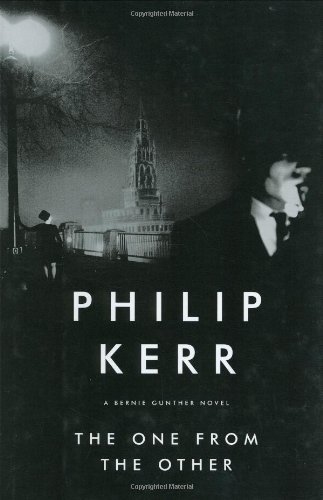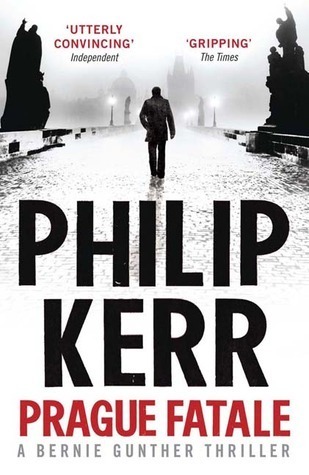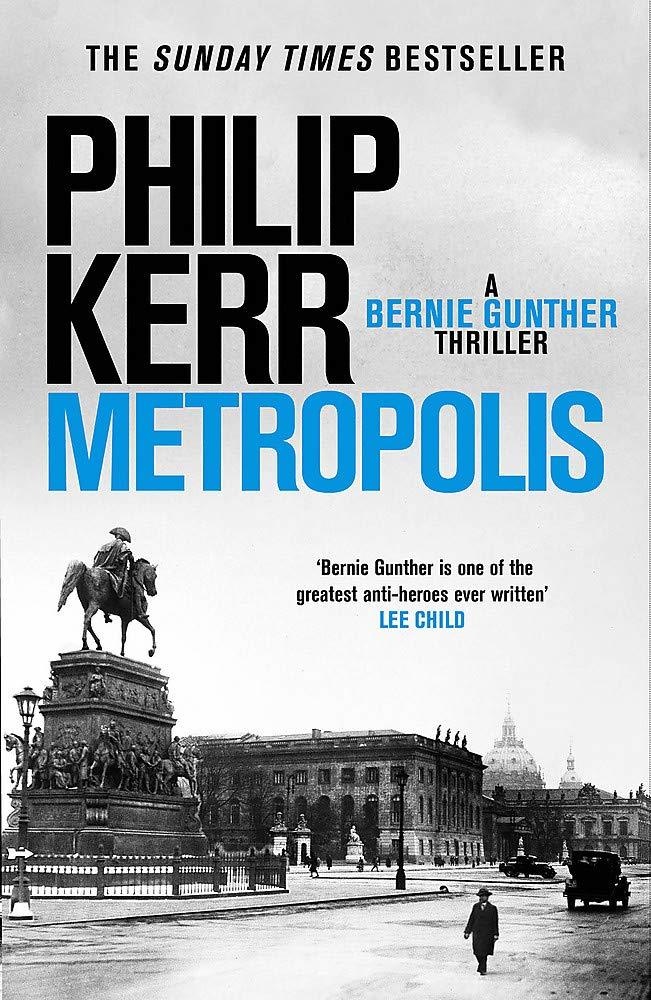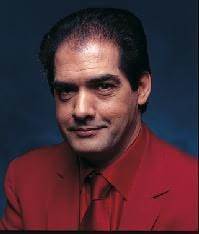


Books in series

#1
March Violets
1989
Hailed by Salman Rushdie as a "brilliantly innovative thriller-writer," Philip Kerr is the creator of taut, gripping, noir-tinged mysteries that are nothing short of spellbinding.
The first book of the Berlin Noir trilogy, March Violets introduces readers to Bernie Gunther, an ex-policeman who thought he'd seen everything on the streets of 1930's Berlin; until he turned freelance and each case he tackled sucked him further into the grisly excesses of Nazi subculture. Bernhard Gunther, a hard-boiled Berlin detective who specializes in tracking down missing persons—mostly Jews. He is summoned by a wealthy industrialist to find the murderer of his daughter and son-in-law, killed during the robbery of a priceless diamond necklace. Gunther quickly is catapulted into a major political scandal involving Hitler's two main henchmen, Goering and Himmler. The search for clues takes Gunther to morgues overflowing with Nazi victims; raucous nightclubs; the Olympic games where Jesse Owens tramples the theory of Aryan racial superiority; the boudoir of a famous actress; and finally to the Dachau concentration camp. Fights with Gestapo agents, shoot-outs with adulterers, run-ins with a variety of criminals, and dead bodies in unexpected places keep readers guessing to the very end.
Hard-hitting, fast-paced, and richly detailed, March Violets is noir writing at its blackest and best.

#2
The Pale Criminal
1990
In the sweltering summer heat wave of 1938, the German people anxiously await the outcome of the Munich conference, wondering whether Hitler will plunge Europe into another war. Meanwhile, private investigator Bernie Gunther has taken on two cases involving blackmail. The first victim is a rich widow. The second is Bernie himself.
Having been caught framing an innocent Jew for a series of vicious murders, the Kripo—the Berlin criminal police—are intent on locating the real killer and aren't above blackmailing their former colleague to get the job done. Temporarily promoted to the rank of Kommissar, Bernie sets out to solve the dual mysteries and begins an investigation that will expose him to the darkest depths of humanity...
Hailed by Salman Rushdie as a "brilliantly innovative thriller-writer," Philip Kerr is the creator of taut, gripping, noir-tinged mysteries that are nothing short of spellbinding. In this second book of the Berlin Noir trilogy, The Pale Criminal brings back Bernie Gunther, an ex-policeman who thought he’d seen everything on the streets of 1930s Berlin—until he turned freelance and each case he tackled sucked him further into the grisly excesses of Nazi subculture. Hard-hitting, fast-paced, and richly detailed, The Pale Criminal is noir writing at its blackest and best.

#3
A German Requiem
1991
The disturbing climax to the Berlin Noir trilogy
Philip Kerr's Bernie Gunther novels have won him an international reputation as a master of historical suspense. In A German Requiem, the private eye has survived the collapse of the Third Reich to find himself in Vienna. Amid decaying imperial splendor, he traces concentric circles of evil and uncovers a legacy that makes the wartime atrocities seem lily-white in comparison.

#4
The One from the Other
2006
Philip Kerr’s Berlin Noir trilogy—featuring the tough, fast-talking, noirish detective Bernie Gunther—is a publishing phenomenon that continues to win new fans more than fifteen years after its initial publication. Kerr has brought Bernie back in a highly anticipated thriller that will delight fans of the original books and attract new attention to the backlist. It is 1949 and—after being forced to serve in the SS in the killing fields of Ukraine—Bernie has moved to Munich to reestablish himself as a private investigator. When the beautiful Frau Britta Warzok hires him for an apparently simple job, Bernie’s suspicions flare but the money is too good to turn down. Soon, Bernie is on the run, because in a defeated and divided Germany, it’s hard to know friends from enemies, the one from the other.

#5
A Quiet Flame
2008
Philip Kerr returns with his best-loved character, Bernie Gunther, in the fifth novel in what is now a series: a tight, twisting, compelling thriller that is firmly rooted in history.
A Quiet Flame opens in 1950. Falsely fingered a war criminal, Bernie Gunther has booked passage to Buenos Aires, lured, like the Nazis whose company he has always despised, by promises of a new life and a clean passport from the Perón government. But Bernie doesn't have the luxury of settling into his new home and lying low. He is soon pressured by the local police into taking on a case in which a girl has turned up dead, gruesomely mutilated, and another—the daughter of a wealthy German banker—has gone missing. Both crimes seem to connect to an unsolved case Bernie worked on back in Berlin in 1932. It's not so far-fetched that the cases might be linked: after all, the scum of the earth has been washing up on Argentine shores—state-licensed murderers and torturers—so why couldn't a serial killer be among them?
But Argentina, just like Germany, holds terrible secrets within its corrupt halls of power. When beautiful Anna Yagubsky seeks Gunther out, desperate for help, to find out what happened to her Jewish aunt and uncle who have disappeared, he is drawn into a horror story that rivals everything he has tried so hard to leave behind half a world away.
In this new postwar world, Bernie Gunther is a man without a name or a country, but still in full possession of his conscience. He is "the right kind of hero for his time—and ours."

#6
If The Dead Rise Not
2009
An instant classic in the Bernie Gunther series, with storytelling that is fresher and more vivid than ever. Berlin, 1934: The Nazis have secured the 1936 Olympiad for the city but are facing foreign resistance. Hitler and Avery Brundage, the head of the U.S. Olympic Committee, have connived to soft-pedal Nazi anti- Semitism and convince America to participate. Bernie Gunther, now the house detective at an upscale Berlin hotel, is swept into this world of international corruption and dangerous double-dealing, caught between the warring factions of the Nazi apparatus.
Havana, 1954: Batista, aided by the CIA, has just seized power; Castro is in prison; and the American Mafia is quickly gaining a stranglehold on the city's exploding gaming and prostitution industries. Bernie, who has been unceremoniously kicked out of Buenos Aires, has resurfaced in Cuba with a new life, seemingly one of routine and relative peace. But Bernie discovers that he truly cannot outrun the burden of his past: He soon collides with a vicious killer from his Berlin days, who is mysteriously murdered not long afterward-and an old lover, who may be the murderer.
If the Dead Rise Not is everything fans have come to expect from Philip Kerr: twisted intrigue, tight plotting, quick-witted one-liners, a hang-by-your-thumbs ending, and, most significant, a richer, wiser Bernie Gunther.

#7
Field Gray
2010
Philip Kerr delivers a novel with the noir sensibility of Raymond Chandler, the realpolitik of vintage John le Carré, and the dark moral vision of Graham Greene.
Striding across Europe through the killing fields of three decades-from riot-torn Berlin in 1931 to Adenauer's Germany in 1954, awash in duplicitous "allies" busily undermining one another-Field Gray reveals a world based on expediency, where the ends justify the means and no one can be trusted. It brings us a hero who is sardonic, tough- talking, and cynical, but who does have a rough sense of humor and a rougher sense of right and wrong. He's Bernie Gunther. He drinks too much and smokes excessively and is somewhat overweight (but a Russian prisoner-of-war camp will take care of those bad habits). He's Bernie Gunther-a brave man, because when there is nothing left to lose, honor rules."Bernie Gunther is the most antiheroic of antiheroes in this gripping, offbeat thriller. It's the story of his struggle to preserve what's left of his humanity, and his life, in a world where the moral bandwidth is narrow, satanic evil at one end, cynical expediency at the other." –Philip Caputo, author of A Rumor of War
"A thriller that will challenge preconceptions and stimulate the little grey cells." –The Times (London), selecting Field Gray as a Thriller of the Year
"Part of the allure of these novels is that Bernie is such an interesting creation, a Chandleresque knight errant caught in insane historical surroundings. Bernie walks down streets so mean that nobody can stay alive and remain truly clean." –John Powers, Fresh Air (NPR)
Bernie on Bernie: I didn't like Bernhard Gunther very much. He was cynical and world-weary and hardly had a good word to say about anyone, least of all himself. He'd had a pretty tough war . . . and done quite a few things of which he wasn't proud... It had been no picnic for him since then either; it didn't seem to matter where he spread life's tartan rug, there was always a turd on the grass.

#8
Prague Fatale
2011
September 1941. Bernie Gunther returns from the horrors of the Eastern Front to find his home city of Berlin changed, and changed for the worse. Now back at his old desk on Homicide in Kripo HQ, Alexanderplatz, Bernie starts to investigate the death of a Dutch railway worker, while starting something - of an entirely different nature - with a local good-time girl.
But he is obliged to drop everything when his old boss, Reinhard Heydrich of the SD, the new Reichsprotector of Bohemia and Moravia, orders him to Prague to spend a weekend at his country house. It's an invitation Bernie feels he would gladly have been spared, especially when he meets his fellow guests - all of them senior loathsome figures in the SS and SD.
The weekend turns sour almost immediately when a body is found, in a room that was locked from the inside. Now the spotlight falls on Bernie to show off his investigative skills and solve this seemingly impossible mystery. If he fails to do so, he knows what is at stake - not only his reputation, but also that of Reinhard Heydrich, a man who does not like to lose face.
So begins the most diplomatically sensitive case of Bernie Gunther's police career.

#9
A Man Without Breath
2013
Berlin, March, 1943. A month has passed since the stunning defeat at Stalingrad. Though Hitler insists Germany is winning the war, commanders on the ground know better. Morale is low, discipline at risk. Now word has reached Berlin of a Red massacre of Polish officers in the Katyn Forest near Smolensk. If true, the message it would send to the troops is clear: Fight on or risk certain death. For once, both the Wehrmacht and Propaganda Minister Goebbels want the same thing: irrefutable evidence of this Russian atrocity. To the Wehrmacht, such proof will soften the reality of its own war crimes in the eyes of the victors. For Goebbels, such proof could turn the tide of war by destroying the Alliance, cutting Russia off from its western supply lines.
Both parties agree that the ensuing investigation must be overseen by a professional trained in sifting evidence and interrogating witnesses. Anything that smells of incompetence or tampering will defeat their purposes. And so Bernie Gunther is dispatched to Smolensk, where truth is as much a victim of war as those poor dead Polish officers.
Smolensk, March, 1943. Army Group Center is an enclave of Prussian aristocrats who have owned the Wehrmacht almost as long as they’ve owned their baronial estates, an officer class whose families have been intermarrying for generations. The wisecracking, rough-edged Gunther is not a good fit. He is, after all, a Berlin bull. But he has a far bigger concern than sharp elbows and supercilious stares, for somewhere in this mix is a cunning and savage killer who has left a trail of bloody victims.
This is no psycho case. This is a man with motive enough to kill and skills enough to leave no trace of himself. Bad luck that in this war zone, such skills are two-a-penny. Somehow Bernie must put a face to this killer before he puts an end to Bernie.

#10
The Lady from Zagreb
2015
A beautiful actress, a rising star of the giant German film company UFA, now controlled by the Propaganda Ministry. The very clever, very dangerous Propaganda Minister—close confidant of Hitler, an ambitious schemer and flagrant libertine. And Bernie Gunther, former Berlin homicide bull, now forced to do favors for Joseph Goebbels at the Propaganda Minister’s command.
This time, the favor is personal. And this time, nothing is what it seems.
Set down amid the killing fields of Ustashe-controlled Croatia, Bernie finds himself in a world of mindless brutality where everyone has a hidden agenda. Perfect territory for a true cynic whose instinct is to trust no one.

#11
The Other Side of Silence
2016
Once I’d been a good detective in Kripo, but that was a while ago, before the criminals wore smart gray uniforms and nearly everyone locked up was innocent.” Being a Berlin cop in 1942 was a little like putting down mousetraps in a cage full of tigers.The war is over. Bernie Gunther, our sardonic former Berlin homicide detective and unwilling SS officer, is now living on the French Riviera. It is 1956 and Bernie is the go-to guy at the Grand-Hotel du Cap-Ferrat, the man you turn to for touring tips or if you need a fourth for bridge. As it happens, a local writer needs just that, someone to fill the fourth seat in a regular game that is the usual evening diversion at the Villa Mauresque. Not just any writer. Perhaps the richest and most famous living writer in the world: W. Somerset Maugham. And it turns out it is not just a bridge partner that he needs; it’s some professional advice. Maugham is being blackmailed—perhaps because of his unorthodox lifestyle. Or perhaps because of something in his past, because once upon a time, Maugham worked for the British secret service, and the people now blackmailing him are spies.
As Gunther fans know, all roads lead back to the viper’s nest that was Hitler’s Third Reich and to the killing fields that spread like a disease across Europe. Even in 1956, peace has not come to the continent: now the Soviets have the H-bomb and spies from every major power feel free to make all of Europe their personal playground.

#12
Prussian Blue
2017
From New York Times–bestselling author Philip Kerr, the much-anticipated return of Bernie Gunther, our compromised former Berlin bull and unwilling SS officer. With his cover blown, he is waiting for the next move in the cat-and-mouse game that, even a decade after Germany’s defeat, continues to shadow his life.
The French Riviera, 1956: The invitation to dinner was not unexpected, though neither was it welcome. Ernst Mielke, deputy head of the East German Stasi, has turned up in Nice, and he’s not on holiday. An old and dangerous adversary, Mielke is calling in a debt. He intends that Bernie go to London and, with the vial of Thallium he now pushes across the table, poison a female agent they both have had dealings with.
But chance intervenes in the form of Friedrich Korsch, an old Kripo comrade now working for Stasi and probably there to make sure Bernie gets the job done. Bernie bolts for the German border. Traveling by night, holed up during the day, Bernie has plenty of down time to recall the last time Korsch and he worked together.
It was the summer of 1939: At Hitler’s mountaintop retreat in Obersalzberg, the body of a low-level bureaucrat has been found murdered. Bernie and Korsch are selected to run the case. They have one week to solve the murder—Hitler is due back then to celebrate his fiftieth birthday. Lucky Bernie: it’s his reward for being Kripo’s best homicide detective. He knows what a box he’s in: millions have been spent to secure Obersalzberg. It would be a disaster if Hitler were to discover a shocking murder had been committed on the terrace of his own home. But the mountaintop is home to an elite Nazi community. It would be an even bigger disaster for Bernie if one of them was the murderer.
1939 and 1956: two different eras, seventeen years apart. And yet, not really apart, as the stunning climax will show when the two converge explosively.

#13
Greeks Bearing Gifts
2018
1957. El destino ha llevado a Bernie Gunther a trabajar en una compañía de seguros de Múnich, donde hace lo que mejor sabe: investigar. Desde allí, le destinan a Atenas para comprobar una reclamación por un barco hundido, propiedad de un ciudadano alemán. Cuando descubre que la embarcación perteneció a un judío que fue deportado a Auschwitz, a Gunther ya no le cabe duda de que el naufragio no fue un accidente. El fantasma del nazismo y la Segunda Guerra Mundial vuelven a cruzarse en su camino.

#14
Metropolis
2019
Berlin, 1928, the dying days of the Weimar Republic shortly before Hitler and the Nazis came to power. It was a period of decadence and excess as Berliners - after the terrible slaughter of WWI and the hardships that followed - are enjoying their own version of Babylon. Bernie is a young detective working in Vice when he gets a summons from Bernard Weiss, Chief of Berlin's Criminal Police. He invites Bernie to join KIA - Criminal Inspection A - the supervisory body for all homicide investigation in Kripo. Bernie's first task is to investigate the Silesian Station killings - four prostitutes murdered in as many weeks. All of them have been hit over the head with a hammer and then scalped with a sharp knife.Bernie hardly has time to acquaint himself with the case files before another prostitute is murdered. Until now, no one has shown much interest in these victims - there are plenty in Berlin who'd like the streets washed clean of such degenerates. But this time the girl's father runs Berlin's foremost criminal ring, and he's prepared to go to extreme lengths to find his daughter's killer.
Then a second series of murders begins - of crippled wartime veterans who beg in the city's streets. It seems that someone is determined to clean up Berlin of anyone less than perfect. The voice of Nazism is becoming a roar that threatens to drown out all others. But not Bernie Gunther's ...

#1-3
Berlin Noir
March Violets / The Pale Criminal / A German Requiem
1993
Now published in one paperback volume, these three mysteries are exciting and insightful looks at life inside Nazi Germany—richer and more readable than most histories of the period. We first meet ex-policeman Bernie Gunther in 1936, in March Violets (a term of derision which original Nazis used to describe late converts.) The Olympic Games are about to start; some of Bernie's Jewish friends are beginning to realize that they should have left while they could; and Gunther himself has been hired to look into two murders that reach high into the Nazi Party. In The Pale Criminal, it's 1938, and Gunther has been blackmailed into rejoining the police by Heydrich himself. And in A German Requiem, the saddest and most disturbing of the three books, it's 1947 as Gunther stumbles across a nightmare landscape that conceals even more death than he imagines. (For a review of Kerr's latest novel, The Grid, see our Thrillers section.)
Author

Philip Kerr
Author · 33 books
Philip Kerr was a British author. He was best known for his Bernie Gunther series of 13 historical thrillers and a children's series, Children of the Lamp, under the name P.B. Kerr. Librarian’s note: There is more than one author in the Goodreads database with this name.